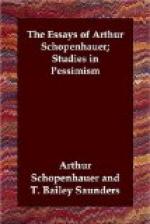With young girls Nature seems to have had in view what, in the language of the drama, is called a striking effect; as for a few years she dowers them with a wealth of beauty and is lavish in her gift of charm, at the expense of all the rest of their life; so that during those years they may capture the fantasy of some man to such a degree that he is hurried away into undertaking the honorable care of them, in some form or other, as long as they live—a step for which there would not appear to be any sufficient warranty if reason only directed his thoughts. Accordingly, Nature has equipped woman, as she does all her creatures, with the weapons and implements requisite for the safeguarding of her existence, and for just as long as it is necessary for her to have them. Here, as elsewhere, Nature proceeds with her usual economy; for just as the female ant, after fecundation, loses her wings, which are then superfluous, nay, actually a danger to the business of breeding; so, after giving birth to one or two children, a woman generally loses her beauty; probably, indeed, for similar reasons.
And so we find that young girls, in their hearts, look upon domestic affairs or work of any kind as of secondary importance, if not actually as a mere jest. The only business that really claims their earnest attention is love, making conquests, and everything connected with this—dress, dancing, and so on.
The nobler and more perfect a thing is, the later and slower it is in arriving at maturity. A man reaches the maturity of his reasoning powers and mental faculties hardly before the age of twenty-eight; a woman at eighteen. And then, too, in the case of woman, it is only reason of a sort—very niggard in its dimensions. That is why women remain children their whole life long; never seeing anything but what is quite close to them, cleaving to the present moment, taking appearance for reality, and preferring trifles to matters of the first importance. For it is by virtue of his reasoning faculty that man does not live in the present only, like the brute, but looks about him and considers the past and the future; and this is the origin of prudence, as well as of that care and anxiety which so many people exhibit. Both the advantages and the disadvantages which this involves, are shared in by the woman to a smaller extent because of her weaker power of reasoning. She may, in fact, be described as intellectually short-sighted, because, while she has an intuitive understanding of what lies quite close to her, her field of vision is narrow and does not reach to what is remote; so that things which are absent, or past, or to come, have much less effect upon women than upon men. This is the reason why women are more often inclined to be extravagant, and sometimes carry their inclination to a length that borders upon madness. In their hearts, women think that it is men’s business to earn money and theirs to spend it—– if possible during their husband’s life, but, at any rate, after his death. The very fact that their husband hands them over his earnings for purposes of housekeeping, strengthens them in this belief.




